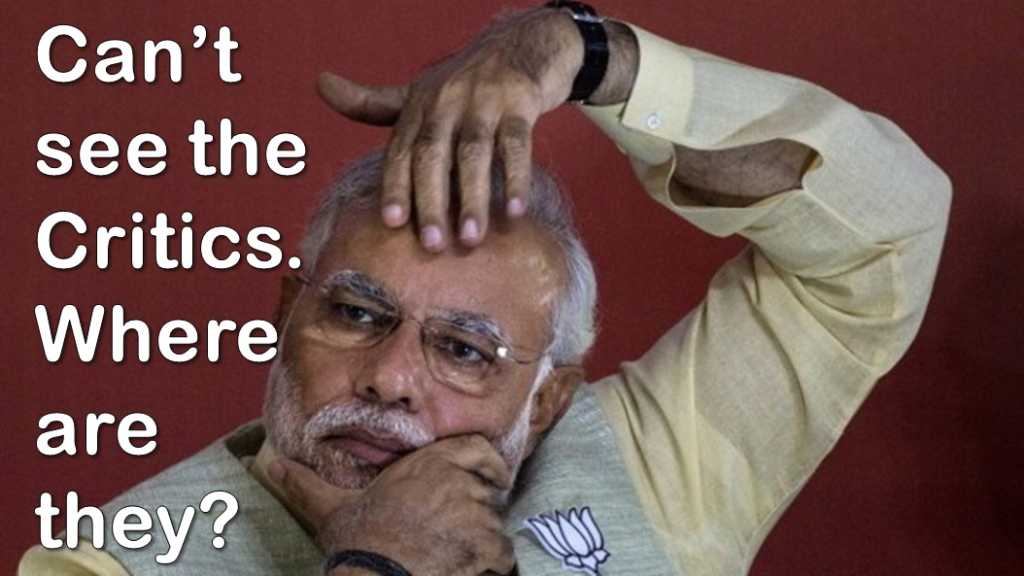Over the last few days, we have been hearing a lot about the Indian economy being in shambles. GDP growth plummeting to 5.7%, lack of private investments, job creation not happening at the expected pace are some of the concerns raised by some of the economists and these theories have been further propagated by the opposition and sections of the mainstream media, all of them wearing their economist’s hat despite being nothing but propaganda machines, people who are constantly on the lookout for spreading negativity about anything and everything in India because of their deep hatred for an ideology and more specifically their deep hatred for one man, the PM of India. Of course the detractors included some real economists too, like the renowned economist former Prime Minister Dr Manmohan Singh, who is without doubt an institution of knowledge, but is blinded by his loyalty to the first family. Then there are the old NDA warhorses, the ex Finance Minister Yeshwant Sinha, fondly known as Rollback Sinha, and Arun Shourie, who have both been sidelined by the government and have clearly not taken it kindly.
Two announcements gave the newly turned economists a shot in the arm. One was the announcement by RBI that 99% of the demonetized amount has made its way to the banks and demonetization was therefore dubbed a disaster. A narrative was built that there was absolutely no black money in the form of cash and all the pains that the people underwent was in futility. Tons of shell companies detected, money coming back into the system with further actions to penalize the evaders, increase in the number of tax payers, digital transactions getting a boost were all conveniently ignored. The other announcement was about the GDP growth rate dipping to 5.7%. This was attributed to demonetization and to the apparently hurried implementation of GST. Only in India does one call a legislation that has come into effect after languishing in parliament for more than a decade a hurried one. All the opposition parties were part of the lawmaking with not one member opposing when the bill was passed in the Rajya Sabha. The GST Council also has representations from all the parties.
The Indian public is well aware of these venomous forces and these forces have been exposed time and again. Three recent impartial opinions have yet again exposed them and brought home the point that the economy is in good shape, these are short term glitches and demonetization was by no means a disaster. Richard Thaler, the Nobel Prize winner in Economics for the year 2017 has voiced his opinion in favor of demonetization. He has mentioned that this is a policy that he long supported and it is a good start to tackle corruption and moving towards a cashless society. He was however critical of the government’s decision to introduce the Rs 2000 note.
Morgan Stanley has predicted that India would grow 10% annually in the coming decade. Morgan Stanley insists that India is on a strong trajectory and digitization would go a long way in boosting growth.
They have further predicted that India would be a $6 trillion dollar economy by 2027. They go on to say that digitization would get a boost with high number of youngsters joining the work force and that use of mobile banking technology would see a phenomenal rise.
The third and most important reassurance has come from the International Monetary Fund (IMF) chief Christine Lagarde. IMF Chief says that although they have slightly downgraded India, the Indian economy is on a very solid track in the mid-term.
IMF Chief described both demonetization and the implementation of GST as ‘monumental effort’. The slowdown that we are witnessing now is only a temporary one and as a result of these structural reforms, the economy is stable. IMF Chief went on to say that the basics of the economy are intact with the fiscal deficit being under control and inflation being in check.
The Congress has a rich legacy of scams like 2G, Coalgate, Augusta Westland, Commonwealth, Bofors, National Herald and many more. During UPA-2, they had messed up the economy with fiscal deficit hovering around 5% of the GDP, high inflation and low foreign reserves. With such a not very envious track record, Congress has no moral high ground to give lectures on how to manage the economy. While in power, the Congress did not take a single step to check the menace of black money and were completely okay with maintaining a status quo on things. Instead of being a responsible opposition and questioning the government where required, the Congress is only indulging in dirty blame game. Former Finance Minister P Chidambaram, whose role as FIPB chief during the UPA-2 had resulted in his now fugitive son Karti Chidambaram getting a slew of benefits, should first answer when Karti is going to return to India rather than spreading unnecessary negativity and trying to score political brownie points.
Lastly, the people of India have been equally responsible for the mess we are in. Giving and accepting bribes, undervaluation of property, tax evasion have all become norms. Any big bang step to clean up the rot is bound to cause short term disruptions and people, who were till now outside the system, will have obvious issues when they are forced to become part of the system. People of India have never seen corruption as a grave offence and this can be vindicated by corrupt leaders like Lalu Yadav, Sasikala, Sonia Gandhi, Yeddyurappa etc having their fan base intact. Changing this mindset will require some unpopular steps being taken. When the IMF chief, with no vested interests, has mentioned what she has, it makes sense to be patient and wait for things to turn over.
